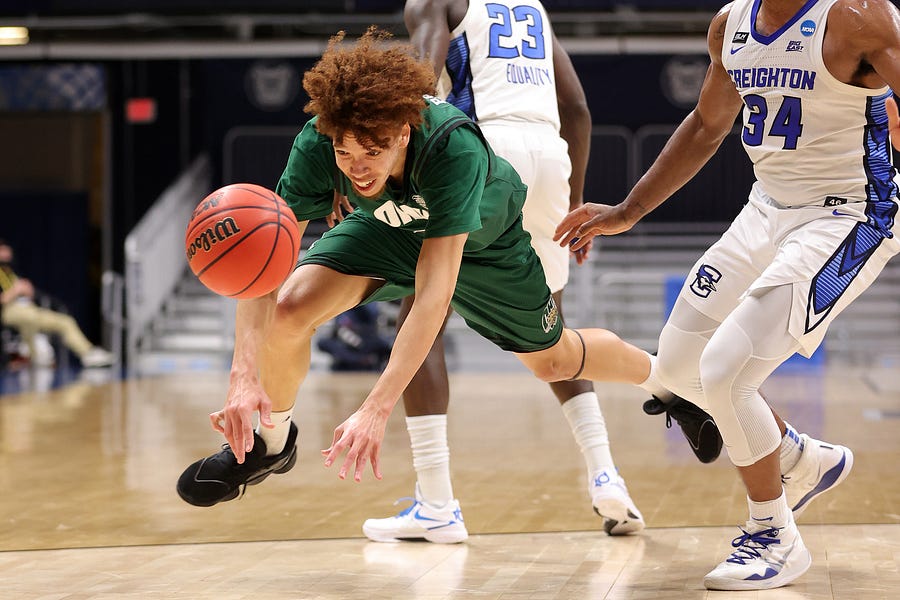Happy Saturday! We hope you had a better week than the crew of the Ever Given, the massive ship that went adrift and got stuck sideways in the Suez Canal.
It was a pretty good week here in the Ohio bureau. Last weekend I got to watch my alma mater, Ohio University, earn a big victory in the NCAA Tournament, knocking out defending champion Virginia in the first round. My Bobcats lost on Monday night to Creighton, but the team is young and the future is bright. Can’t wait for next year.
March Madness has always been my favorite sporting event of the year, at least in years without a Summer Olympics. I remember, as a kid, getting the issue of Sports Illustrated that featured the brackets as the centerfold and carefully bending back the staples so I could take it out and fill in my predictions. In college, I was lucky enough to cover the OU men’s basketball team when they won the Mid-American Conference tournament and earned a bid, so I got to attend in person (only the first round, alas). When we turned our basement into, for lack of a better term, a “man cave” a few years ago, we installed three televisions. Not because we’re ostentatious, but because during the first couple of rounds of the tournament, there might be up to three games on at once. Who wants to choose?
This year, the tournament feels like a bit of a barometer for where we are. Last year, March Madness was one of the first big casualties of the coronavirus pandemic, and it illustrated the uncertainty we faced. Some teams earn bids to the tournament just based on the strength of their record, but every conference gets at least one team in. For smaller programs, winning your conference tournament is the only way to guarantee a spot. Last year, those conference tournaments were underway when the NBA shut down and some governors started locking down their states. The Big Ten Tournament was canceled while teams were warming up for their first game; the Big East canceled its tournament during halftime of a game. The NCAA announced on March 11 that it would play March Madness games with no spectators. Within 24 hours, it canceled the whole thing.
Now, a year later, the tournament is back. It’s not quite the same: The NCAA scrapped its usual practice of playing games at various sites around the country for a sort-of bubble in Indiana (and in Texas for the women’s tournament). The schedule, which for as long as I can remember ran Thursday-to-Sunday for the first two weekends, is a little off. I was itching to reach for the remote on Thursday this week, but instead the games started on Saturday and run through Tuesday. There are very few spectators. One team, Virginia Commonwealth, had to forfeit its first round game after positive COVID tests.
It’s imperfect, but we have it. We even invited a few friends—who’d either had COVID already or been vaccinated—over to watch games. We had all three TVs going. There were upsets—including my Ohio State Buckeyes losing to No. 15 seed Oral Roberts. (Did I also call the Bobcats my team up above? I did. You’re allowed to have more than one favorite team in March. I make no apologies.)
As vaccinations increase and warmer weather means we can all get outdoors, more normalcy is coming. It’s not going to be perfect for a while yet. But we’re getting there.
Thanks for reading! Please don’t forget that now is a great time to join The Dispatch if you haven’t already, as we are doing a special 30-day free trial. Getting 13 months of The Dispatch for the price of 12? That’s almost as sweet as your team pulling off a first-round upset.
A Minnesota judge faced criticism after indicating in a pretrial hearing for police officer Derek Chauvin that he would allow evidence detailing George Floyd’s behavior during a 2019 arrest. Wait a second, the critics said. Floyd was Chauvin’s victim. Law professor Ted Sampsell-Jones offers an in-depth explanation of Minnesota’s character evidence rules. Limits on admitting character evidence are designed to give defendants a fair trial, but over the years and through the courts, they have been watered down by prosecutors eager to earn convictions. “Courts have expanded the common plan doctrine far beyond its original bounds to include all prior similar offenses—even if they are not linked to the charged crime, even if they are not constituent parts of a whole.” And now Chauvin’s lawyers are trying to take advantage.
Remember all the talk of a 9/11-style commission to investigate the events at the Capitol on January 6? Democrats suggested that would be a better solution to learning what happened than calling witnesses during President Trump’s second impeachment trial. So … how’s it going? Not well, Haley reports in Uphill. For all the comparisons to the 9/11 commission, that panel was evenly split between Democrats and Republicans. Speaker Nancy Pelosi’s proposal for a commission provides for 11 members, with seven Democrats and four Republicans. Meanwhile, some Republicans want to include investigations into how the violence that resulted from last summer’s racial justice protests might have contributed to the events at the Capitol.
Over the past few decades, gun rights supporters had an obvious retort to calls for more gun control from the left. The decrease in violent crime rates around the country came at a time when gun ownership was increasing: “More guns, less crime.” All along, the Supreme Court has taken very few cases addressing the issue of gun control. And now, just as the court considers whether to take New York State Rifle and Pistol Association v. Corlett, a case that could answer whether gun owners have a right to carry outside their homes, popular sentiment is again trending against gun rights in the wake of two horrifying mass shootings in Georgia and Colorado. Why does this matter? Because for all their skill and trainings, judges are still human beings. “I have long argued,” David writes, “that American gun rights depend greatly not just on the text and original meaning of the Constitution, but also on the present conditions in American streets and schools.”
And now for the best of the rest:
-
Much of the focus on H.R. 1, the House bill that would overhaul our election system, has been focused on campaign finance, early and absentee voting, and voting registration. But fully one-third of the 800-page bill targets political speech, including disclosure mandates for nonprofits. Casey Mattox explains how such measures will chill speech and worsen our polarization.
-
As a Gen Xer (some would argue the best generation), Chris Stirewalt remembers the 1990s. So he’s a little mystified by the recent surge in nostalgia for it. “It felt very much like, well, the lamest possible moment in human history: homogenized, corporate, and painfully politically correct.”
-
House Minority Leader Kevin McCarthy has complained that terrorists are using the border crisis to sneak into the U.S., and Axios reported recently that four such suspects have been caught since October. Elisabeth Neumann points out that yes, the border is vulnerable, but it’s dangerous to elevate isolated incidents into a national security threat.
-
The International Olympic Committee has a bad habit of awarding Olympic Games to authoritarian governments, which in turn use them as geopolitical events to boost their standing on the world stage. With the 2022 Winter Olympics scheduled for Beijing, and many calling for the U.S. to boycott in response to the Chinese Communist Party’s multitudes of human rights offenses, Ellen Bork offers an alternative: Let the games go on, just not in China.
-
Last but not least, the pods: On The Remnant, Tevi Troy joins Jonah to talk about cancel culture and debate Marvel vs. DC Comics. David and Sarah catch up on the latest Supreme Court goings-on, look at a Second Amendment case before the 9th Circuit, and share Netflix recommendations on Advisory Opinions. And if you wonder what we thought about Sidney Powell’s motion to dismiss the lawsuit against her filed by Dominion Voting Systems, don’t miss The Dispatch Podcast.








Please note that we at The Dispatch hold ourselves, our work, and our commenters to a higher standard than other places on the internet. We welcome comments that foster genuine debate or discussion—including comments critical of us or our work—but responses that include ad hominem attacks on fellow Dispatch members or are intended to stoke fear and anger may be moderated.
You are currently using a limited time guest pass and do not have access to commenting. Consider subscribing to join the conversation.
With your membership, you only have the ability to comment on The Morning Dispatch articles. Consider upgrading to join the conversation everywhere.